Remote care through telehealth for people with inflammatory bowel disease
- PMID: 37140025
- PMCID: PMC10164701
- DOI: 10.1002/14651858.CD014821.pub2
Remote care through telehealth for people with inflammatory bowel disease
Abstract
Background: People with inflammatory bowel disease (IBD) require intensive follow-up with frequent consultations after diagnosis. IBD telehealth management includes consulting by phone, instant messenger, video, text message, or web-based services. Telehealth can be beneficial for people with IBD, but may have its own set of challenges. It is important to systematically review the evidence on the types of remote or telehealth approaches that can be deployed in IBD. This is particularly relevant following the coronavirus disease 2019 (COVID-19) pandemic, which led to increased self- and remote-management.
Objectives: To identify the communication technologies used to achieve remote healthcare for people with inflammatory bowel disease and to assess their effectiveness.
Search methods: On 13 January 2022, we searched CENTRAL, Embase, MEDLINE, three other databases, and three trials registries with no limitations on language, date, document type, or publication status.
Selection criteria: All published, unpublished, and ongoing randomised controlled trials (RCTs) that evaluated telehealth interventions targeted at people with IBD versus any other type of intervention or no intervention. We did not include studies based on digital patient information resources or education resources, unless they formed part of a wider package including an element of telehealth. We excluded studies where remote monitoring of blood or faecal tests was the only form of monitoring.
Data collection and analysis: Two review authors independently extracted data from the included studies and assessed their risk of bias. We analysed studies on adult and paediatric populations separately. We expressed the effects of dichotomous outcomes as risk ratios (RRs) and the effects of continuous outcomes as mean differences (MDs) or standardised mean differences (SMDs), each with their 95% confidence intervals (CIs). We assessed the certainty of the evidence using GRADE methodology.
Main results: We included 19 RCTs with a total of 3489 randomised participants, aged eight to 95 years. Three studies examined only people with ulcerative colitis (UC), two studies examined only people with Crohn's disease (CD), and the remaining studies examined a mix of IBD patients. Studies considered a range of disease activity states. The length of the interventions ranged from six months to two years. The telehealth interventions were web-based and telephone-based. Web-based monitoring versus usual care Twelve studies compared web-based disease monitoring to usual care. Three studies, all in adults, provided data on disease activity. Web-based disease monitoring (n = 254) is probably equivalent to usual care (n = 174) in reducing disease activity in people with IBD (SMD 0.09, 95% CI -0.11 to 0.29). The certainty of the evidence is moderate. Five studies on adults provided dichotomous data that we could use for a meta-analysis on flare-ups. Web-based disease monitoring (n = 207/496) is probably equivalent to usual care (n = 150/372) for the occurrence of flare-ups or relapses in adults with IBD (RR 1.09, 95% CI 0.93 to 1.27). The certainty of the evidence is moderate. One study provided continuous data. Web-based disease monitoring (n = 465) is probably equivalent to usual care (n = 444) for the occurrence of flare-ups or relapses in adults with CD (MD 0.00 events, 95% CI -0.06 to 0.06). The certainty of the evidence is moderate. One study provided dichotomous data on flare-ups in a paediatric population. Web-based disease monitoring (n = 28/84) may be equivalent to usual care (n = 29/86) for the occurrence of flare-ups or relapses in children with IBD (RR 0.99, 95% CI 0.65 to 1.51). The certainty of the evidence is low. Four studies, all in adults, provided data on quality of life. Web-based disease monitoring (n = 594) is probably equivalent to usual care (n = 505) for quality of life in adults with IBD (SMD 0.08, 95% CI -0.04 to 0.20). The certainty of the evidence is moderate. Based on continuous data from one study in adults, we found that web-based disease monitoring probably leads to slightly higher medication adherence compared to usual care (MD 0.24 points, 95% CI 0.01 to 0.47). The results are of moderate certainty. Based on continuous data from one paediatric study, we found no difference between web-based disease monitoring and usual care in terms of their effect on medication adherence (MD 0.00, 95% CI -0.63 to 0.63), although the evidence is very uncertain. When we meta-analysed dichotomous data from two studies on adults, we found no difference between web-based disease monitoring and usual care in terms of their effect on medication adherence (RR 0.87, 95% CI 0.62 to 1.21), although the evidence is very uncertain. We were unable to draw any conclusions on the effects of web-based disease monitoring compared to usual care on healthcare access, participant engagement, attendance rate, interactions with healthcare professionals, and cost- or time-effectiveness. The certainty of the evidence is very low.
Authors' conclusions: The evidence in this review suggests that web-based disease monitoring is probably no different to standard care in adults when considering disease activity, occurrence of flare-ups or relapse, and quality of life. There may be no difference in these outcomes in children, but the evidence is limited. Web-based monitoring probably increases medication adherence slightly compared to usual care. We are uncertain about the effects of web-based monitoring versus usual care on our other secondary outcomes, and about the effects of the other telehealth interventions included in our review, because the evidence is limited. Further studies comparing web-based disease monitoring to standard care for the clinical outcomes reported in adults are unlikely to change our conclusions, unless they have longer follow-up or investigate under-reported outcomes or populations. Studies with a clearer definition of web-based monitoring would enhance applicability, enable practical dissemination and replication, and enable alignment with areas identified as important by stakeholders and people affected by IBD.
Copyright © 2023 The Authors. Cochrane Database of Systematic Reviews published by John Wiley & Sons, Ltd. on behalf of The Cochrane Collaboration.
Conflict of interest statement
MG: has declared that they have no conflicts of interest. VS: has declared that they have no conflicts of interest. AA: was the principal investigator of a previously published randomised controlled trial that investigated the role of telephone consultation in paediatric inflammatory bowel disease. AA was not involved in screening for eligibility, data extraction, or risk of bias assessment for the trial he was involved in (Akobeng 2015). TGH: has declared that they have no conflicts of interest. SL: has declared that they have no conflicts of interest. KB: has declared that they have no conflicts of interest.
The authors MG, AA, and VS are members of Cochrane Gut but were not involved in the editorial process or decision‐making for this review.
Figures
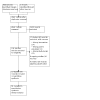
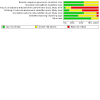
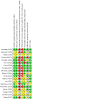

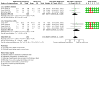
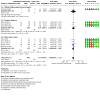


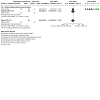

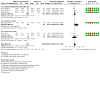

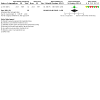
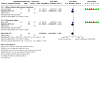
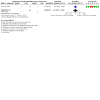

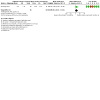
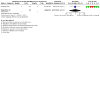
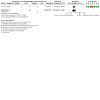
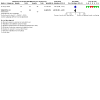
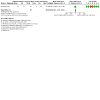
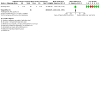
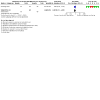
Update of
- doi: 10.1002/14651858.CD014821
References
References to studies included in this review
Akobeng 2015 {published data only}
-
- Akobeng AK, O'Leary N, Vail A, Brown N, Widiatmoko D, Fagbemi A, et al. Telephone consultation as a substitute for routine out-patient face-to-face consultation for children with inflammatory bowel disease: randomised controlled trial and economic evaluation. EBioMedicine 2015;2(9):1251-6. - PMC - PubMed
-
- NCT02319798. Telephone consultation as a substitute for routine out-patient face-to-face consultation for children with inflammatory bowel disease. clinicaltrials.gov/ct2/show/NCT02319798 (first received18 December 2014).
Ankersen 2019 {published data only}
-
- Ankersen DV, Marker D, Weimers P, Burisch J, Munkholm P. DOP031 Individualised home-monitoring of disease activity in adult patients with inflammatory bowel disease can be recommended implemented in clinical practice. Journal of Crohn's and Colitis 2018;12 Suppl 1:S052–3.
-
- Ankersen DV, Weimers P, Marker D, Bennedsen M, Saboori S, Paridaens K, et al. Individualized home-monitoring of disease activity in adult patients with inflammatory bowel disease can be recommended in clinical practice: a randomized-clinical trial. World Journal of Gastroenterology 2019;25(40):6158-71. - PMC - PubMed
-
- NCT02492555. Is relapse rate reduced by home monitoring of IBD patients tightly or on demand by FC and disease activity? clinicaltrials.gov/ct2/show/NCT02492555 (first received 8 July 2015).
Atreja 2018 {published data only}
-
- Atreja A, Khan S, Otobo E, Rogers J, Ullman T, Grinspan A, et al. Impact of real world home-based remote monitoring on quality of care and quality of life in IBD patients: interim results of pragmatic randomized trial. Gastroenterology 2017;152(5):S600-1.
-
- Atreja A, Khan S, Otobo E, Rogers J, Ullman T, Grinspan A, et al. P554 Impact of real world home based remote monitoring on quality of care and quality of life in inflammatory bowel disease patients: one year results of pragmatic randomized trial. Journal of Crohn's and Colitis 2017;11 Suppl 1:S362-3.
-
- Atreja A, Khan S, Rogers JD, Otobo E, Patel NP, Ullman T, et al. Impact of the mobile HealthPROMISE platform on the quality of care and quality of life in patients with inflammatory bowel disease: study protocol of a pragmatic randomized controlled trial. JMIR research protocols 2015;4(1):e23. - PMC - PubMed
-
- Atreja A, Khan S, Szigethy E, Otobo E, Shroff H, Chang H, et al. Improved quality of care for IBD patients using HealthPROMISE App: a randomized, control trial: P-003. Official Journal of the American College of Gastroenterology 2018;113:S1.
-
- Atreja A, Otobo E, Szigethy E, Kohli A, Shroff H, Chang H, et al. P057 Improved quality of care and quality of life for IBD patients using mobile based remote monitoring platform: a randomized control trial. Inflammatory Bowel Diseases 2018;24 Suppl 1:S21-2.
Carlsen 2017a {published data only}
-
- Carlsen K, Houen G, Jakobsen C, Kallemose T, Paerregaard A, Riis LB, et al. Individualized infliximab treatment guided by patient-managed ehealth in children and adolescents with inflammatory bowel disease. Inflammatory bowel diseases 2017;23(9):1473-82. - PubMed
-
- Carlsen K, Jakobsen C, Hansen LF, Paerregaard A, Kallemose T, Houen G, et al. Self-administered telemedicine empowers paediatric and adolescent patients with inflammatory bowel disease. Journal of Crohn's & Colitis 2016;10:S53-4.
-
- Carlsen K, Jakobsen C, Hansen LF, Paerregaard A, Kallemose T, Houen G, et al. Self-administered telemedicine empowers paediatric and adolescent patients with inflammatory bowel disease. Journal of Pediatric gastroenterology and Nutrition 2016;62 Suppl 1:131.
-
- Carlsen K, Jakobsen C, Hansen LF, Paerregaard A, Kallemose T, Riis LB, et al. Quality of life in paediatric inflammatory bowel disease patients in a self-administered telemedicine randomised clinical study. Journal of Crohn's & Colitis 2016;10:S421-2.
-
- Carlsen K, Jakobsen C, Hansen LF, Paerregaard A, Riis LB, Munkholm PS, et al. Self-administered telemedicine reduces number of outpatient visits and days of absence from school in paediatric and adolescent patients with inflammatory bowel disease. Journal of Crohn's and Colitis 2016;10:S53.
Chauhan 2016 {published data only}
-
- Chauhan U, Armstrong D, Farbod Y, Halder SL, Kaasalainen S, Marshall JK, et al. Telephone vs. clinic follow-up in the management of patients with inflammatory bowel disease: a nurse practitioner led study. Gastroenterology 2016;1:S235.
-
- Chauhan U, Armstrong D, Halder S, Marshall J, Tse F, Pinto Sanchez M, et al. Telephone versus clinic follow-up in management of patients with inflammatory bowel disease. Canadian Journal of Gastroenterology and Hepatology 2016;2016:A257.
-
- Chauhan U, Armstrong D, Halder SL, Marshall JK, Tse F, Sanchez MP, et al. Telephone vs clinic follow-up in the management of patients with inflammatory bowel disease: a nurse practitioner-led study. Journal of Crohn's and Colitis 2016;493:S505.
Cross 2012 {published data only}
-
- Cross R, Cheevers N, Rustgi A, Hanahan A, Steele AG, Lydecker A, et al. T1240 A randomized, controlled trial of home telemanagement in patients with ulcerative colitis. Gastroenterology 2010;5(138):S-519.
-
- Cross RK, Finkelstein J. Challenges in the design of a Home Telemanagement trial for patients with ulcerative colitis. Clinical Trials 2009;6(6):649-57. - PubMed
-
- NCT00620126. The home telemanagement (UC HAT) trial for patients with ulcerative colitis. clinicaltrials.gov/ct2/show/NCT00620126 (first received 21 February 2008).
Cross 2019 {published data only}
-
- Bilgrami Z, Abutaleb A, Chudy-Onwugaje K, Cross R. TU1747–Effect of telemedicine for inflammatory bowel disease (tele-IBD) on patient activation and general self-efficacy. Gastroenterology 2019;156(6):S-1109.
-
- Cross RK, Jambaulikar G, Langenberg P, Tracy JK, Collins JF, Katz J, et al. TELEmedicine for patients with Inflammatory Bowel Disease (TELE-IBD): design and implementation of randomized clinical trial. Contemporary Clinical Trials 2015;42:132-44. - PubMed
-
- Cross RK, Langenberg P, Regueiro M, Schwartz DA, Tracy JK, Collins JF, et al. A randomized controlled trial of TELEmedicine for patients with inflammatory bowel disease (TELE-IBD). Official Journal of the American College of Gastroenterology 2019;114(3):472-82. - PubMed
de Jong 2017 {published data only}
-
- NCT02173002. Integrated care for inflammatory bowel disease patients in the Netherlands with the novel telemedicine tool myIBDcoach: a randomized controlled trial. clinicaltrials.gov/ct2/show/NCT02173002 (first received 24 June 2014).
-
- Jong M, Van Der Meulen A, Romberg-Camps M, Becx M, Cilissen M, Maljaars J, et al. Telemedicine enables a safe shift from examination room based care to personalized care for inflammatory bowel disease: a pragmatic randomized multicenter trial with myIBDcoach. Gastroenterology 152;5:S186.
-
- Jong M, Der Meulen-De Jong A, Romberg-Camps M, Becx M, Maljaars JPW, Cilissen M, et al. Personalised care with the telemedicine tool myibdcoach is cost-effective. A cost-utility analysis of the myibdcoach trial. United European Gastroenterology Journal 2018;6(8):A649.
-
- Jong M, Meulen-de Jong A, Romberg-Camps M, Becx M, Markus T, Maljaars J, Mahmmod N, et al. Telemedicine for inflammatory bowel disease patients with MyIBDcoach: description of the myIBDcoach trial. Journal of Crohn's & Colitis 2016;10:S198.
-
- Jong M, Meulen-de Jong A, Romberg-Camps M, Degens J, Becx M, Markus T, et al. Development and feasibility study of a telemedicine tool for all patients with IBD: MyIBDcoach. Inflammatory Bowel Diseases 2017;23(4):485-93. - PubMed
Del Hoyo 2018 {published data only}
-
- Aguas M, Del Hoyo J, Faubel R, Muñoz D, Domínguez D, Bastida G, et al. P301 Effects of telemonitoring on safety and health care costs with a web platform (TECCU) in complex IBD patients: a randomised controlled trial. Journal of Crohn's and Colitis 2018;12 Suppl 1:S252-3.
-
- Aguas M, Del Hoyo J, Muñoz D, Faubel R, Barrios A, Navarro B, et al. P205 A telemanagement system web in patients with complex inflammatory bowel disease: design and implementation of a randomized clinical trial. Journal of Crohn's and Colitis 2017;11 Suppl 1:no pagination.
Elkjaer 2010a {published data only}
-
- Elkjaer M, Shuhaibar M, Burisch J, Bailey Y, Scherfig H, Laugesen B, et al. E-health empowers patients with ulcerative colitis: a randomised controlled trial of the web-guided 'Constant-care' approach. Gut 2010;59(12):1652-61. - PubMed
-
- Elkjaer M. E-health: web-guided therapy and disease self-management in ulcerative colitis. Impact on disease outcome, quality of life and compliance. Danish Medical Journal 2012;59(7):B4478. - PubMed
Heida 2018 {published data only}
-
- Heida A, Dijkstra A, Groen H, Kobold AM, Verkade H, Rheenen P. Comparing the efficacy of a web-assisted calprotectin-based treatment algorithm (IBD-live) with usual practices in teenagers with inflammatory bowel disease: study protocol for a randomized controlled trial. Trials 2015;16(1):1. - PMC - PubMed
-
- Heida A, Dijkstra A, Kobold A, Kindermann A, Kokke F, Meij T, et al. Telemonitoring versus usual care: a multicenter trial among teenagers with inflammatory bowel disease. Journal of Pediatric Gastroenterology and Nutrition 2017;65 Suppl 1:S3.
-
- Heida A, Dijkstra A, Muller Kobold A, Rossen JW, Kindermann A, Kokke F, et al. Efficacy of home telemonitoring versus conventional follow-up: a randomized controlled trial among teenagers with inflammatory bowel disease. Journal of Crohn's and Colitis 2018;12(4):432-41. - PubMed
Hughes 2017 {published data only}
-
- Hughes LD, Fischer A, Goodliffe S, Irving PM, Moss-Morris R. PTH-101 A manualised intervention to reduce psychological distress in inflammatory bowel disease: a pilot randomised controlled feasibility trial. Gut 2017;66 Suppl 2:A256-7.
Ley 2020 {published data only}
-
- Ley D, Martin B, Caldera F. Use of an iphone application to increase adherence in patients with ulcerative colitis in remission: a randomized controlled trial. Inflammatory Bowel Diseases 2020;26(5):e33-4. - PubMed
Malickova 2020 {published data only}
-
- Malickova K, Pesinova V, Bortlik M, Duricova D, Machkova N, Hruba V, et al. P373 Telemedicine and inflammatory bowel disease: Results of the IBD assistant pilot project. Journal of Crohn's and Colitis 2020;14 Suppl 1:S352-3.
-
- Malickova K, Pesinova V, Bortlik M, Duricova D, Machkova N, Hruba V, et al. Telemedicine and inflammatory bowel disease: results of the IBD assistant pilot project [Telemedicína a idiopatické střevní záněty – výsledky pilotního projektu IBD Asistent]. Gastroenterology & Hepatology 2020;74(1):18-27.
McCombie 2020 {published data only}
-
- McCombie A, Walmsley R, Barclay M, Ho C, Langlotz T, Regenbrecht H, Gray A, et al. A noninferiority randomized clinical trial of the use of the smartphone-based health applications IBDsmart and IBDoc in the care of inflammatory bowel disease patients. Inflammatory bowel diseases 2020;26(7):1098-109. - PubMed
-
- Walmsley RS, McCombie A, Barclay M, Ho C, Visesio N, Brown S, Schulz M. Non-inferiority randomised clinical trial of the use of the smartphone-based health applications IBDsmart and IBDoc® in the care of inflammatory bowel disease patients. Congress of the ECCO 2019;no volume:no pagination. - PubMed
Reich 2019 {published data only}
-
- Reich J, Canakis A, Shankar D, Harrington J, Apte M, Weinberg J, et al. The use of an EHR patient portal (Mychart-Epic) in patients with inflammatory bowel disease. Crohn's & Colitis 360 2019;1(3):otz039.
-
- Reich J, Harrington JE, Shankar D, Jones E, Weinberg J, Norohna A, et al. The use of an EMR patient portal (MYCHART-EPIC) in patients with inflammatory bowel disease: preliminary results of a randomized clinical trial: 609. Official Journal of the American College of Gastroenterology 2018;113:S349.
Siegel 2018 {published data only}
-
- Siegel CA, Thompson KD, Siegel LS, MacKenzie T, Dubinsky M. Crohn's disease decision aid leads to more patients choosing combination therapy in a cluster randomized controlled trial. Journal of Crohn's and Colitis 2018;12 Suppl 1:S076-7.
Stunkel 2012 {published data only}
-
- Stunkel L, Karia K, Okoji O, Warren R, Jean T, Jacob V, et al. Impact on quality of life of a smart device mobile application in patients with inflammatory bowel disease: 1575. Official Journal of the American College of Gastroenterology 2012;107:S635-6.
Wang 2020 {published data only}
-
- Wang K, Peng N, Qi J, Sun L, Gong J, Zhu W. Efficacy of a nurse-led WeChat follow-up program on adherence to azathioprine in Crohn's disease patients: a randomized controlled trial [基于护士主导的微信平台改善克罗恩病病人硫唑嘌呤服药依从性的研究]. Chinese Nursing Research 2020;34(5):828-34.
References to studies excluded from this review
Ankersen 2017 {published data only}
-
- Ankersen DV, Marker D, Weimers P, Burisch J, Munkholm P. Home monitoring of disease activity and fecal calprotectin in adult patients with inflammatory bowel disease-interim analysis of 68 patients. United European Gastroenterology Journal 2017;5(5):A287.
Camba 2013 {published data only}
-
- Camba AH, Carrillo M, Ramos L, Alonso I, Alvarez-Buylla NH, Fernandez OA, et al. E-mail reminders and adherence rates to medical treatment in patients with inflammatory bowel disease. Journal of Crohn's and Colitis 2013;7:S112.
-
- Camba AH, Carrillo-Palau M, Ramos L, Alonso-Abreu I, Hernandez N, Alarcon O, et al. E-mail reminders and adherence rates to medical treatment in patients with inflammatory bowel disease. Gastroenterology 2013;5(144):S779.
Carlsen 2017b {published data only}
-
- Carlsen K, Houen G, Jakobsen C, Kallemose T, Paerregaard A, Riis LB, et al. Individualized infliximab treatment guided by patient-managed eHealth in children and adolescents with inflammatory bowel disease. Inflammatory Bowel Diseases 2017;23(9):1473-82. - PubMed
-
- Carlsen K, Houen G, Jakobsen C, Kallemose T, Paerregaard A, Riis LB, et al. Individualized infliximab treatment guided by patient-managed eHealth in children and adolescents with inflammatory bowel disease. Inflammatory Bowel Diseases 2017;23(9):1473-82. - PubMed
-
- Carlsen K, Jakobsen C, Hansen LF, Paerregaard A, Kallemose T, Houen G, et al. Self-administered telemedicine empowers paediatric and adolescent patients with inflammatory bowel disease. Journal of Crohn's and Colitis 2016;10:S53-4.
-
- Carlsen K, Jakobsen C, Hansen LF, Paerregaard A, Kallemose T, Riis LB, et al. Quality of life in paediatric inflammatory bowel disease patients in a self-administered telemedicine randomised clinical study. Journal of Crohn's and Colitis 2016;10:S421-2.
-
- Carlsen K, Jakobsen C, Hansen LF, Paerregaard A, Riis LB, Munkholm PS, Wewer V. Self-administered telemedicine reduces number of outpatient visits and days of absence from school in paediatric and adolescent patients with inflammatory bowel disease. Journal of Crohn's and Colitis 2016;10:S53.
Creed 2019 {published data only}
-
- Creed E, Clark K. Virtual biologics clinic for IBD patients improving patient and service experience. BMJ 2019;68:A234.
Del Hoyo 2021 {published data only}
-
- Del Hoyo J, Aguas M. Cost-effectiveness of telemedicine-directed specialized vs standard care for patients with inflammatory bowel diseases in a randomized trial. Clinical Gastroenterology and Hepatology 2021;19(1):206-7. - PubMed
Elkjaer 2010b {published data only}
-
- Elkjaer M, Burisch J, Avnstrom S, Lynge E, Munkholm P. Development of a web-based concept for patients with ulcerative colitis and 5-aminosalicylic acid treatment. European Journal of Gastroenterology & Hepatology 2010;22(6):695-704. - PubMed
Gray 2020 {published data only}
Greenley 2015 {published data only}
-
- Greenley R, Kunz J, Gumidyala A, Nguyen E, Poulopoulos N, Thomason M, et al. P-173 Improving oral medication adherence in adolescents with IBD: year 3 results of the PHONE trial. Inflammatory Bowel Diseases 2013;19 Suppl 1:S95.
-
- Greenley R, Nguyen E, Kunz J, Gumidyala A, Thomason M, Walter J, et al. O-10 Improving oral medication adherence in pediatric IBD by teaching problem solving skills: year 2 results of the PHONE trial. Inflammatory Bowel Diseases 2012;Suppl 1:S6.
-
- Greenley R, Nguyen E, Kunz J, Gumidyala A, Thomason M, Walter J, et al. P-160 Improving oral medication adherence in pediatric IBD by teaching problem solving skills: year 2 results of the PHONE trial. Inflammatory Bowel Diseases 2012;18 Suppl 1:S79-80.
-
- Greenley R, Nguyen E, Kunz JH, Biank V, Blank, E, Miranda A, et al. Phone intervention to improve pediatric oral medication adherence: preliminary acceptability and feasibility: P-148. Inflammatory Bowel Diseases 2011;17 Suppl 2:S57.
-
- Greenley RN, Gumidyala AP, Nguyen E, Plevinsky JM, Poulopoulos N, Thomason MM, et al. Can you teach a teen new tricks? Problem solving skills training improves oral medication adherence in pediatric patients with inflammatory bowel disease participating in a randomized trial. Inflammatory Bowel Diseases 2015;21(11):2649-57. - PubMed
Jambaulikar 2015 {published data only}
-
- Jambaulikar GD, Lee J, Aholoukpe M, Regueiro M, Schwartz DA, Ghazi LJ, et al. Internal locus of control and increased self-efficacy are associated with higher quality of life in patients with inflammatory bowel disease. Gastroenterology 2015;148(4):S841.
Krier 2011 {published data only}
-
- Krier M, Kaltenbach T, McQuaid K, Soetikno R. Potential use of telemedicine to provide outpatient care for inflammatory bowel disease. Official Journal of the American College of Gastroenterology 2011;106(12):2063-7. - PubMed
-
- Krier MJ, Kaltenbach TR, McQuaid KR, Soetikno RM. Broadening the access to specialized IBD care using a consumer grade affordable telemedicine system. Gastroenterology 2010;138 Suppl 1:S473.
-
- NCT01296841. Telemedicine to provide inflammatory bowel disease outpatient care. clinicaltrials.gov/ct2/show/study/NCT01296841 (first received 16 February 2011).
Mastronardi 2020 {published data only}
Miloh 2017 {published data only}
-
- Miloh T, Shub M, Montes R, Ingebo K, Silber G, Pasternak B. Text messaging effect on adherence in children with inflammatory bowel disease. Journal of Pediatric Gastroenterology and Nutrition 2017;64(6):939-42. - PubMed
Moss 2010 {published data only}
-
- Chaudhary N, Junior J, Tukey M, Falchuk KR, Cheifetz A, Moss AC. S1053 Impact of a patient support program on mesalamine adherence in patients with ulcerative colitis. Gastroenterology 2009;136(5):A178. - PubMed
-
- Moss AC, Chaudhary N, Tukey M, Junior J, Cury D, Falchuk KR, et al. Impact of a patient-support program on mesalamine adherence in patients with ulcerative colitis—a prospective study. Journal of Crohn's and Colitis 2010;4(2):171-5. - PubMed
NCT00310362 {published data only}
-
- NCT00310362. Use of telehealth in-home messaging to improve GI (gastrointestinal) endoscopy completion rates. clinicaltrials.gov/ct2/show/NCT00310362 (first received 3 April 2006).
NCT01852097 {published data only}
-
- NCT01852097. An online intervention to address barriers to IBD medication adherence [A pilot randomised controlled trial to determine the feasibility, acceptability and effectiveness of a CBT based online intervention to address practical and perceptual barriers to medication adherence in inflammatory bowel disease]. clinicaltrials.gov/ct2/show/NCT01852097 (first received 13 May 2013).
NCT02265588 {published data only}
-
- NCT02265588. Healthy approach to physical and psychological problems in youngsters with IBD (HAPPY-IBD). clinicaltrials.gov/ct2/show/NCT02265588 (first received 16 October 2014).
NCT02707068 {published data only}
-
- NCT02707068. Quality Of LIfe Tool for IBD [Quality Of LIfe Tool for IBD (QOLITI): pilot testing of a self-administered intervention to target psychological distress in inflammatory bowel disease]. clinicaltrials.gov/ct2/show/NCT02707068 (first received 14 March 2016).
NCT03486158 {published data only}
-
- NCT03486158. The CalproSmartNOR Study – a new clinical tool for monitoring patients with inflammatory bowel disease. clinicaltrials.gov/ct2/show/study/NCT03486158 (first received 3 April 2018).
NCT03695783 {published data only}
-
- NCT03695783. The IBD&me randomized controlled trial [Impact of a web-based decision aid on shared decision-making in patients with inflammatory bowel disease: the ibd&me randomized controlled trial]. clinicaltrials.gov/ct2/show/NCT03695783 (first received 3 April 2018).
NCT04151420 {published data only}
-
- NCT04151420. Real life remote monitoring of mild, moderate and severe infectious complications in ibd by patient reported assessment. clinicaltrials.gov/ct2/show/NCT04151420 (first received 5 November 2019).
NCT04165265 {published data only}
-
- NCT04165265. The use of web-app constant-care in patients with acute severe ulcerative colitis treated with rescue therapy. clinicaltrials.gov/ct2/show/NCT04165265 (first received 15 November 2019).
Oser 2018 {published data only}
-
- Oser M, Szigethy E, Wallace ML, Weaver EK, Culp A, Kogan J, Regueiro MD. Randomized adaptive trial of digital behavioral program for anxiety and depression in ibd patient centered medical home. Gastroenterology 2018;154(6):S-153.
RBR‐79dn4k {published data only}
-
- RBR-79dn4k. Effect of a program on drug use in patients with Ulcerative Colitis [Impact of an intervention program on nonadherence to drugs in ulcerative colitis patients: randomized clinical trial]. ensaiosclinicos.gov.br/rg/RBR-79dn4k (first received 1 February 2020).
Snoei 2009 {published data only}
Sutton 2019 {published data only}
Tripp 2017 {published data only}
-
- Tripp DA, Verreault P, Gates J, Ropeleski M, Beyak M. Development and piloting of a cognitive-behavioral selfmanagement program for patients with inflammatory bowel disease: an early stage update. Gastroenterology 2017;152(5):S799.
Zhang 2020 {published data only}
-
- Zhang Y, Pi B, Xu X, Li Y, Chen X, Yang N. Influence of narrative medicine-based health education combined with an online patient mutual assistance group on the health of patients with inflammatory bowel disease and arthritis. Psychology Research and Behavior Management 2020;13(101514563):1-10. - PMC - PubMed
References to studies awaiting assessment
Bonnaud 2021 {published data only}
-
- Bonnaud G, Haennig A, Altwegg R, Caron B, Boivineau L, Zallot C, et al. Real-life pilot study on the impact of the telemedicine platform EasyMICI–MaMICI® on quality of life and quality of care in patients with inflammatory bowel disease. Scandinavian Journal of Gastroenterology 2021;56(5):530-6. - PubMed
Hommel 2015 {published data only}
-
- NCT01536509. Improving medication adherence in pediatric inflammatory bowel disease (TEAM). clinicaltrials.gov/ct2/show/NCT01536509 (first received 22 February 2012).
NCT02085083 {published data only}
-
- NCT02085083. Improving outcomes in the pediatric to adult care transition in inflammatory bowel disease (IMPACT-IBD). clinicaltrials.gov/ct2/show/NCT02085083 (first received 12 March 2014).
NCT02694042 {published data only}
-
- NCT02694042. Mission is remission®: how can a disease self-management website change care? clinicaltrials.gov/ct2/show/NCT02694042 (first received 29 February 2016).
NCT03059186 {published data only}
-
- NCT03059186. A gratitude intervention in improving well-being and coping in people living with inflammatory bowel disease. clinicaltrials.gov/ct2/show/NCT03059186 (first received 23 February 2017).
NCT03186872 {published data only}
-
- NCT03186872. Improving quality of care with a digital behavioral program in ibd patient centered medical home. clinicaltrials.gov/ct2/show/NCT03186872 (first received 14 June 2017).
NCT04754620 {published data only}
-
- NCT04754620. Distant management of Crohn's disease by smartphones is feasible and effective additionally it reduces the costs. clinicaltrials.gov/ct2/show/NCT04754620 (first received 15 February 2021).
NTR2892 {published data only}
-
- NTR2892. Adherence as a lifetime effort [Promoting recall of information and treatment adherence]. www.trialregister.nl/trial/2753 (first received 11 May 2011).
NTR4648 {published data only}
-
- NTR4648. Improving adherence in ulcerative colitis patients on 5-ASA. https://www.trialregister.nl/trial/4406 (first received 17 June 2014).
References to ongoing studies
ACTRN12617000389303 {published data only}
-
- ACTRN12617000389303. Teleconsulting versus normal consulting in the care of inflammatory bowel disease in rural Southern District Health Board patients. [Establishing the role of Teleconsulting in the care of chronic conditions in rural areas of the Southern District Health Board (SDHB): A randomised controlled trial (RCT) in patients with inflammatory bowel disease]. www.anzctr.org.au/Trial/Registration/TrialReview.aspx?id=372543&isRe... (first received 16 March 2017).
IRCT2020061304775 {published data only}
-
- IRCT20200613047757N1. Designing a mobile-based inflammatory bowel disease management system by using gamification techniques and determining its effectiveness on disease activity index, mental health and quality of life [Evaluation of the effectiveness of mobile-based inflammatory bowel disease management system by using gamification techniques on disease activity index, mental health and quality of life]. www.irct.ir/trial/59842 (first received 16 November 2021).
NCT03985800 {published data only}
-
- NCT03985800. Specialty medical homes to improve outcomes for patients with IBD and behavioral health conditions. clinicaltrials.gov/ct2/show/NCT03985800 (first received 14 June 2019).
NCT04207008 {published data only}
-
- NCT04207008. Trial of a decision support intervention for adolescents and young adults with ulcerative colitis (iBDecide). clinicaltrials.gov/ct2/show/NCT04207008 (first received 20 December 2019).
NCT04388865 {published data only}
-
- NCT04388865. Patient Automated Text Hovering for IBD (PATH-IBD). clinicaltrials.gov/ct2/show/NCT04388865 (first received 14 May 2020).
NCT04653259 {published data only}
-
- NCT04653259. Digital nutrition therapy for patients with IBD (LYFEMD). clinicaltrials.gov/ct2/show/NCT04653259 (first received 4 December 2020).
NCT04861597 {published data only}
-
- NCT04861597. Digital behavioral interventions in inflammatory bowel disease. clinicaltrials.gov/ct2/show/NCT04861597 (first received 27 April 2021).
Norton 2021 {published data only}
-
- ISRCTN71618461. A supported online self-management for symptoms of fatigue, pain and urgency/incontinence in people with inflammatory bowel disease: the IBD-BOOST trial [A randomised controlled trial of supported online self-management for symptoms of fatigue, pain and urgency/incontinence in people with inflammatory bowel disease: the IBD-BOOST trial]. www.isrctn.com/ISRCTN71618461 (first received 2 September 2019).
-
- Norton C, Syred J, Kerry S, Artom M, Sweeney L, Hart A, et al. Supported online self-management versus care as usual for symptoms of fatigue, pain and urgency/incontinence in adults with inflammatory bowel disease (IBD-BOOST): study protocol for a randomised controlled trial. Trials 2021;22(1):1-18. - PMC - PubMed
RBR‐7t8fv7 {published data only}
-
- RBR-7t8fv7. Clinical trial of the effectiveness of telephone nursing care to individuals with inflammatory bowel disease. ensaiosclinicos.gov.br/rg/RBR-7t8fv7 (first received 25 July 2016).
Additional references
Al‐Ani 2020
Bernstein 2011
-
- Bernstein KI, Promislow S, Carr R, Rawsthorne P, Walker JR, Bernstein CN. Information needs and preferences of recently diagnosed patients with inflammatory bowel disease. Inflammatory Bowel Diseases 2011;17(2):590-8. - PubMed
Choi 2014
Colagiuri 2010
-
- Colagiuri B. Participant expectancies in double-blind randomized placebo-controlled trials: potential limitations to trial validity. Clinical Trials 2010;7(3):246-55. - PubMed
Cross 2012
Eady 2008
Egger 1997
Elkjaer 2012
-
- Elkjaer M. E-health: web-guided therapy and disease self-management in ulcerative colitis. Impact on disease outcome, quality of life and compliance. Danish Medical Journal 2012;59(59):B4478. - PubMed
Feuerstein 2020
Feuerstein 2021
Forducey 2012
Ghosh 2015
Gordon 2016
Gordon 2020
-
- Gordon M, Guyatt G. Assessment of evidence quality in inflammatory bowel disease guidance: the use and misuse of GRADE. Gastroenterology 2020;159:1209-15. - PubMed
Gordon 2021a
Gordon 2022
GRADEpro GDT [Computer program]
-
- GRADEpro Guideline Development Tool [Software]. Version Accessed March 2021. McMaster University (developed by Evidence Prime, Inc), 2020. Available from www.gradepro.org.
Groom 2021
Hedges
-
- Search Strategies for EMBASE in Ovid Syntax. hiru.mcmaster.ca/hiru/HIRU_Hedges_EMBASE_Strategies.aspx.
Heida 2018
-
- Heida A, Dijkstra A, Muller Kobold A, Rossen JW, Kindermann A, Kokke F, et al. Efficacy of home telemonitoring versus conventional follow-up: a randomized controlled trial among teenagers with inflammatory bowel disease. Journal of Crohn's and Colitis 2018;12(4):432-41. - PubMed
Higgins 2011
-
- Higgins JP, Green S, editor(s). Cochrane Handbook for Systematic Reviews of Interventions Version 5.1.0 (updated March 2011). The Cochrane Collaboration, 2011. Available from training.cochrane.org/handbook/archive/v5.1/.
Higgins 2020
-
- Higgins JP, Thomas J, Chandler J, Cumpston M, Li T, Page MJ, et al, editor(s). Cochrane Handbook for Systematic Reviews of Interventions Version 6.1 (updated September 2020). Cochrane, 2021. Available from training.cochrane.org/handbook/archive/v6.1/.
Hoffman 2013
Huang 2014
Ko 2019
Lamb 2019
Lefebvre 2022
-
- Lefebvre C, Glanville J, Briscoe S, Featherstone R, Littlewood A, Marshall C, et al. Chapter 4: Searching for and selecting studies. In: Higgins JP, Thomas J, Chandler J, Cumpston M, Li T, Page MJ, Welch VA, editor(s). Cochrane Handbook for Systematic Reviews of Interventions Version 6.3 (updated February 2022). Cochrane, 2022. Available from www.training.cochrane.org/handbook.
McLean 2009
McLean 2011
-
- McLean S, Protti D, Sheikh A. Telehealthcare for long-term conditions. BMJ 2011;342:d120. - PubMed
Ng 2017
-
- Ng SC, Shi HY, Hamidi N, Underwood FE, Tang W, Benchimol EI, et al. Worldwide incidence and prevalence of inflammatory bowel disease in the 21st century: a systematic review of population-based studies. Lancet 2017;390(10114):2769-78. - PubMed
Nguyen 2022
Page 2021
RevMan Web 2022 [Computer program]
-
- Review Manager Web (RevMan Web). Version 4.12.0. The Cochrane Collaboration, 2022. Available at revman.cochrane.org.
Rimmer 2013
-
- Rimmer JH, Wang E, Pellegrini CA, Lullo C, Gerber BS. Telehealth weight management intervention for adults with physical disabilities: a randomized controlled trial. American Journal of Physical Medicine & Rehabilitation 2013;92(12):1084-94. - PubMed
Sood 2007
-
- Sood S, Mbarika V, Jugoo S, Dookhy R, Doarn CR, Prakash N, et al. What is telemedicine? A collection of 104 peer-reviewed perspectives and theoretical underpinnings. Telemedicine and e-Health 2007;13(5):573-90. - PubMed
References to other published versions of this review
Publication types
MeSH terms
LinkOut - more resources
Full Text Sources
Medical
Research Materials
Miscellaneous

